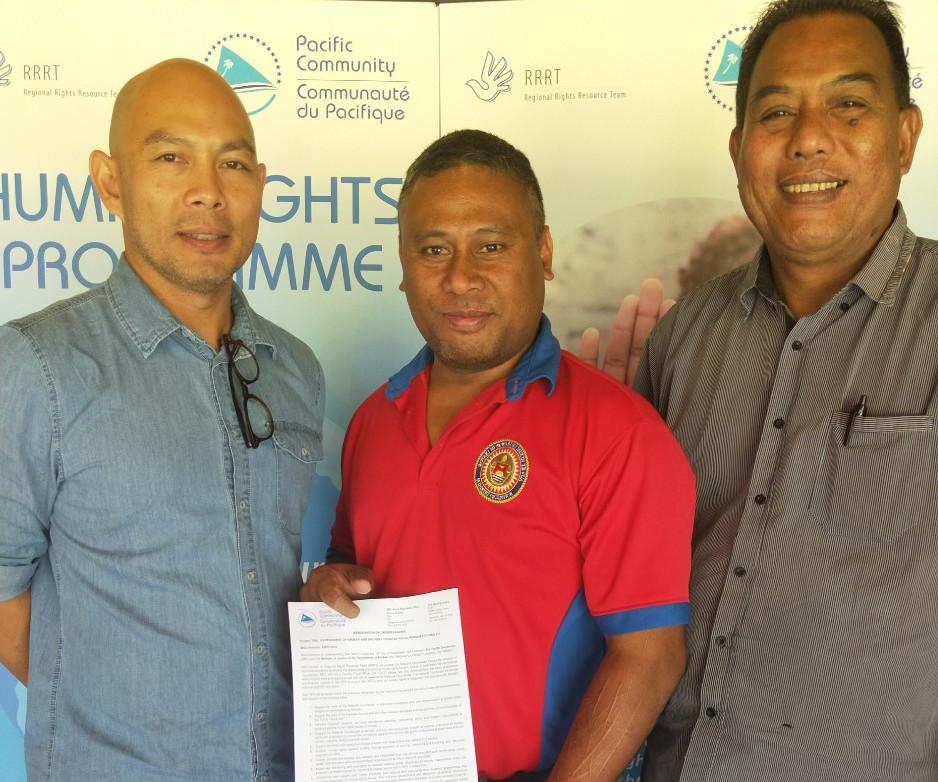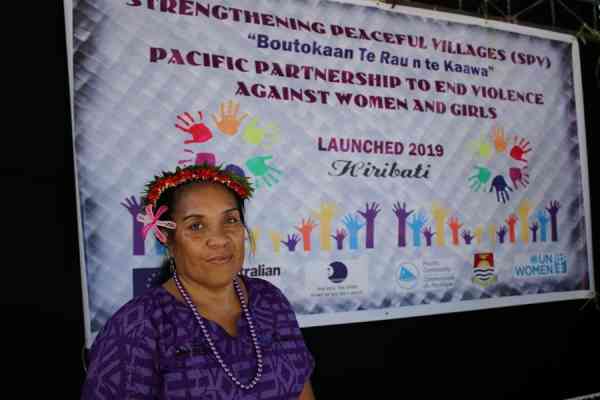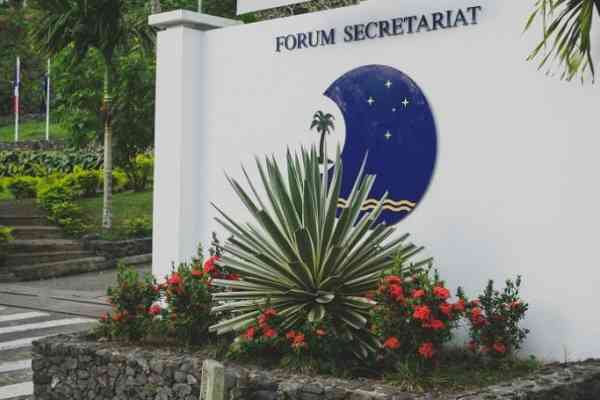RRRT Director Miles Young (left) with RRRT Kiribati Country Focal Officer Amberoti Nikora (right) and Permanent Secretary of the Kiribati Ministry of Justice, Birimaaka Tekanene (centre) on signing the MOU
Bullying, social exclusion and gender balance are words that sound foreign but sadly are rooted in our modern Pacific lifestyle. At a recent Social Citizenship Workshop held in Kiribati, a group of lecturers from Kiribati Teachers College highlighted these three social issues as key challenges to their work.
The lecturers were looking to share ideas, experiences and strategies for working through these social issues with the help of the Pacific Community’s (SPC) Regional Resources Rights Team (RRRT). Kiribati is forging ahead in the Pacific on human rights and social issues through the establishment of the first Human Rights Unit within a Pacific Island nation’s Ministry of Justice. As a result of this, knowledge of and awareness about human rights issues in Kiribati is gaining positive momentum.
Since July 2018, a collaboration under the Pacific Partnership to End Violence Against Women and Girls has seen three SPC Divisions - RRRT, the Social Development Programme and the Educational Quality and Assessment Programme - collectively implementing the Social Citizenship Education programme in Kiribati, Tuvalu and the Marshall Islands.
According to Nilesh Goundar, SPC RRRT Pacific Partnership Programme Manager, “Social Citizenship is about equipping school students and young people with the skills to be able to make good, considered decisions, work collaboratively and peacefully, and think critically and creatively to ensure the sustainable future of our Pacific countries.”
In Kiribati, this means partnering with the Ministry of Education and Kiribati Teacher’s College to incorporate human rights into the school curriculum, and provide pre-service and in-service training to teachers. The training programme commenced with a training workshop in November 2018 for Teacher’s College lecturers, focussing on: the foundational concepts of human rights and responsibilities; gender equality; social citizenship; and violence against women.
The workshop provided a solid foundation of practical techniques and theory, but the real learning for participants came through sharing first-hand experiences about some of the major social issues in Kiribati classrooms. Participants discovered that they faced many common challenges including bullying, social exclusion, gender inequality and violence against women and girls.
“… we collected the views of the teachers and we believe that bullying is a worse problem in the schools…the social citizenship workshop it give us sort off what are the best ideas and what are the best strategies to address bullying and I know that it is quite related to classroom management.” - Aberaam Tebitaki, Acting Principal, Kiribati Teachers College.
The common underlying issue across the challenges identified is a lack of knowledge on human rights within the education system, for both teachers and students. One of the main goals of the Social Citizenship Education Programme is to raise knowledge and awareness of human rights across communities in Kiribati, focussing on children and young people as agents of change. How to tackle social issues such as bullying in schools is part of the ongoing training programme.
“Citizens with these skills, attitudes and knowledge will only occur when teachers give students the opportunity to learn about and practise being ‘social citizens’. An enabling environment is also important to sustain such skills, which will involve parents and the community at large participating and contributing to this development. This approach should be based on our Pacific values of respect for people and place, inclusivity and belonging, sharing and fairness, and the dignity and worth of every person. It should help our young people to develop self-confidence and successfully deal with significant life changes and challenges.” Nilesh Goundar, SPC RRRT Pacific Partnership Programme Manager”
Support for RRRT’s work generates from the Human Rights Unit established within Kiribati’s Ministry of Justice. This is where RRRT Country Focal Officer, Amberoti Nikora has been based since 2013 to guide RRRTs work in-country. Nikora sits alongside four Ministry of Justice staff, charged with raising awareness of human rights issues at government and community-levels.
As is seen in many Pacific Island Countries, human rights in Kiribati was originally seen as conflicting to existing traditions and social norms. Nikora admits that changing mindsets has taken some time but that the Unit and its staff are making leeway.
Kiribati is the only Pacific Island Country where human rights dialogues are regularly held for Members of Parliament and Ministers. At the request of the Government, SPC RRRT supports the Human Rights Unit to deliver knowledge-building sessions before each Parliamentary sitting. This enables MPs and Ministers to champion human rights in their constituencies.
According to the Permanent Secretary of the Ministry of Justice in Kiribati, Birimaaka Tekanene, key to success to date has been ensuring that RRRT’s programmes are aligned to National Development planning, “…its part of the government development plan, KV20 or Kiribati Vision for 20 Years… our (Ministry of Justice) work is connected to peace and security. And under peace and security the main or core element is human rights. So these are the main areas (where) the Human Rights Unit fits within the Kiribati National Plan; the development of human rights, anti-corruption, implementation of good governance, making sure we have peace and security, and of course there is equality and gender balance.”
In light of this, the Memorandum of Understanding between SPC RRRT and the Kiribati Ministry of Justice was re-signed in November 2018, illustrative of the commitment of the Government of Kiribati to advancing human rights and to collaborating with SPC RRRT to achieve this.
Kiribati, although a small pacific island country, is forging ahead in the region through human rights education and awareness at the Government-level, at community-level and, now with the introduction of the Social Citizenship Education Programme, at school-level. Human rights work in the region does not fit under a one-size-fits-all model but certainly elements of what is working in Kiribati are worth sharing with other island nations.
RRRT’s work with the Kiribati Human Rights Unit sits within the RRRT Business Plan 2017-2021, funded by DFAT and SIDA. RRRT’s Social Citizenship Education programme is funded under the Pacific Partnership. The Pacific Partnership to End Violence Against Women and Girls brings together governments, civil society organisations, communities and other partners to promote gender equality, prevent violence against women and girls, and increase access to quality response services for survivors. The EUR19.5 million programme is funded primarily by the European Union (EUR12.7m) with targeted support from the Australian Government (EUR6.1m or AUD$4.9m) and cost-sharing from UN Women (EUR0.6m).


